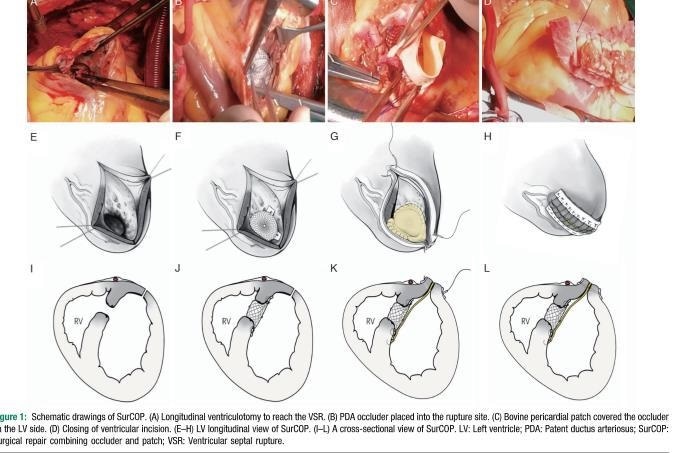Heart attack, medically known as myocardial infarction (MI), is a common heart condition. MI is caused by problems in blood supply to parts of the heart. In severe cases, MI could be accompanied by ruptures in the wall separating different parts of the heart, such as in the ventricular septum (a wall that separates the right ventricle that pumps deoxygenated blood to the lungs for oxygenation, from the left ventricle that pumps oxygenated blood to rest of the body). Not surprisingly, without appropriate surgical intervention, a VSR due to MI increases the chances of death.

Medical researchers devise a new way to repair the ruptured wall of the heart from a severe heart attack. Image Credit: Chinese Medical Journal
Current surgical techniques used to close VSR due to MI have proven ineffective in several situations, which put a group of Chinese medical researchers to work. These researchers from The First Affiliated Hospital of Zhengzhou University and Capital Medical University in China specifically worked on VSR due to MI accompanied by life-threatening fluctuations in blood pressure, or hemodynamic instability (HI). The researchers successfully devised a surgical technique that improved outcomes in patients suffering from VSR and HI due to MI (VSR-HI-MI), according to a study published in Chinese Medical Journal. Further explaining the motivation of their study,
We aimed to present a novel surgical repair technique that can be safely, feasibly, and effectively used in hemodynamically unstable patients with VSR in the acute phase."
Dr. Chao Liu, Study's First Author
The medical researchers, who aimed to save the lives of patients with VSR-HI-MI, call their novel surgical technique as SurCOP, a method combining devices called an occluder and a patch. While the occluder is used to repair the "hole" in the heart, the patch (derived from biocompatible materials) is used to close it. This is an upgraded version of the conventionally used surgical method in which only a simple patch is used. The doctors then tested the improved technique on nine consenting patients with VSR-HI-MI and compared the outcomes to 54 others. The results showed that the procedure had an impressive 100% success rate. Also, compared to a bleak 10% survival rate if managed conservatively, SurCOP achieved a promising 77.8% survival rate when a median follow-up time of 187 days were considered. Importantly, none of the patients who underwent SurCOP developed VSR after the surgery.
These are incredibly promising findings. Overall, the study highlights how well the surgical technique of SurCOP, tackles the clinical problems posed by VSR-HI-MI. Elated at the success of the study, Dr. Liu concludes, "Our experience has shown that the SurCOP technique is a safe, easy-to-manipulate, and effective method. We hope that we could receive feedback from surgeons who will attempt performing this alternative therapeutic technique and work together to improve the prognosis of patients with VSR."
Indeed, the world can now heal a little better from complications arising from heart attacks.
Source:
Journal reference:
Li, C., et al. (2021) A new surgical technique for post-myocardial infarction ventricular septal rupture with hemodynamic instability. Chinese Medical Journal. doi.org/10.1097/CM9.0000000000001442.